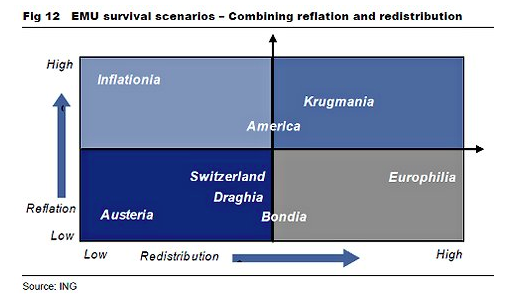Public Goods or Political Pandering: Evidence from IMF Programs in Latin America and Eastern Europe.
By Grigore Pop-Eleches
Overview provided by Lauren Peyton
The author analyzed the extent and reasons for preferential lending practices by the IMF. He examined three periods:
Latin America from 1982-1989 – the debt crisis
Latin America from 1990 – 2001
Eastern Europe from 1990-2001 – the transition away from Communism
He gauged whether the IMF acted in in one of three ways:
- Impartial technocratic logic (what it says it does and is supposed to do)
- Programs driven solely by financial need
2. Systemically motivated preferential treatment (for the greater global good)
- Gauges the economic importance of a country and the intensity of the crisis to judge whether they should receive easier access to IMF funds
3. Narrow economic/geopolitical concerns of its largest shareholders (what everybody believes it does)
Countries with close economic & political ties to powerful western countries (the US, namely) receive more funds and “breaks” in their interactions with the IMF
The dependent variables, or how he decided that the countries were receiving preferential treatment, were (1) the number of programs initiated, (2) loan size, (3) number of program waivers, and (4) program compliance evaluation. (ex: there were 43 programs with 21 Latin American countries from 1982 – 1989, higher frequency than in 1990s, lower frequency than in Eastern Europe).
There were multiple independent variables, or reasons why they might receive preferential treatment, but the three main ones were (1) similarity in UN General Assembly voting records with a powerful western country like the US, (2) US imports into Latin American countries and EU imports into Eastern European countries, and (3) amount of bilateral foreign aid.
He, found, basically, that during periods of extreme crisis, like the Latin American debt crisis in the 1980s, where the failure of large countries could cause extreme global financial instability, the IMF acted strongly in a systemically motivated manner. Large countries, with high foreign debt and low reserves, had easier access to IMF funds during the crisis, but less access to the funds during low crisis times. This was independent of political alliances, trade relations, and foreign aid, which means that the IMF was making a judgment call to help a country whose failure would harm the international global financial system, not because the US wanted to help their friend.
However, in the 1990s, the Latin American countries that received the most bilateral aid from the West had the easiest access to IMF funds, and in Eastern Europe the geopolitical allies and trade partners to the West did (though there were still some clear systemic concerns). So, in the absence of global instability threats, the Fund allows more realist views to guide its actions. He does, however, maintain that “narrow political” aid is not as widespread as many other researchers seem to believe.
In other words, yes, the IMF strays from its stated mission of impartiality. However, in times of extreme crisis, this could be attributed to the Fund’s other mission of ensuring international financial stability and orderly trade expansion. If a country that is “too big to fail” is allowed to do so during such a crisis, the global effect could be catastrophic. So we can conclude that preferential treatment of economically important countries is justified as long as it is confined to crisis situations.
If his argument is true, then the IMF is actually right to give preferential lending opportunities to larger economies, but only during times of extreme crisis. If their failure might cause a global financial crisis, then the IMF is actually fulfilling its mission to ensure their stability. The author recommends setting the bar of “too big to fail” higher, however, so it becomes more difficult to gain aid. This should also only apply in global crisis situations. If the countries in trouble will not have a hugely destabilizing effect on the global market, then the IMF should proceed impartially, giving no preference to allies, trading partners, or aid recipients of Western powers. Preferential treatment wastes IMF resources and undermines the credibility and effectiveness of the IMF, and should only be used in times of global crisis.






